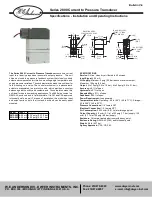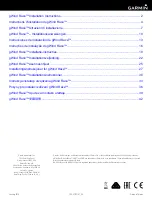
QCX assembly Rev 1.08
83
If the weight is increased from the default 50.0%, then the key-
down “dit” is made longer. A “dah”
is lengthened by the SAME amount. The corresponding inter-symbol (or character, or word) gap is
shortened by the same amount. The additional time spent on the key-down is therefore taken from
the key-up period. The keyer speed is unchanged by altering the weight parameter.
As an example: suppose you want to make your Morse sound “harder” by shortening the dits and
dahs. You could set the parameter to 450, which means 45.0%.
The parameter range is 050 to 950 (5% to 95%) though you would not normally ever need to go
anywhere near these unreasonable limits. In the event that you enter a value outside this range,
the firmware automatically applies these limits to the actually used parameter.
4.5 Auto Space
OFF
Auto-spacing means that the pause between CW characters is forced to be 3 dit lengths (more or
less, if you have CW weighting configured, see above).
The majority of keyers do not implement auto-spacing. You use the paddle to send your dits and
dahs making up the Morse character you wish to send. As soon as you next press the paddle, the
next character is started. The keyer forces correct 1:3 ratio of dits and dahs and inter-symbol
spacing, but it does not force you to wait for the correct duration of 3 dits between transmitted
characters.
Some keyers do implement automatic character spacing, such as the old (1973) Accu-Keyer
design by James WB4VVF see
https://inza.files.wordpress.com/2011/01/accu-keyer.pdf
.
This configuration therefore allows you to switch on automatic character spacing if you wish. In
this case, if you press a paddle too SOON, before the 3 dit durations have elapsed after the last
character completed, the keyer will wait until the correct time to start the next character.
In the even that you press the paddle too LATE, there is nothing the keyer can do to travel back in
time and force it to 3 dit lengths for you. You might have intended an inter-word space, for
example. So pressing the paddle too late cannot be corrected.
4.6 QSK
Full
This setting defines the break-in (QSK) behaviour of the radio. Two settings are possible:
Full
: after the delay time for RF envelope shaping, the Tr
ansmit/Receive switch is set to “Receive”
shortly after key-up. In this way, you will hear the other station (or any QRM, QRN etc) transmitting
in between the dits and dahs of your own transmissions. Many experienced operators like to be
able to have a feel for what is happening on the band, in between their key-downs. In some ways
you feel like you are listening to your own sidetone audio as just another signal on the band, and
you can still hear other signals too.
Summary of Contents for QCX 5W CW
Page 9: ...QCX assembly Rev 1 08 9...
Page 10: ...QCX assembly Rev 1 08 10...
Page 12: ...QCX assembly Rev 1 08 12...
Page 50: ...QCX assembly Rev 1 08 50...
Page 105: ...QCX assembly Rev 1 08 105...
















































